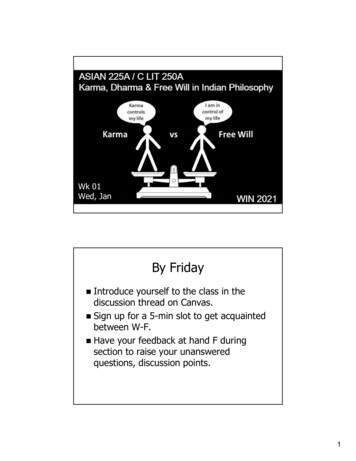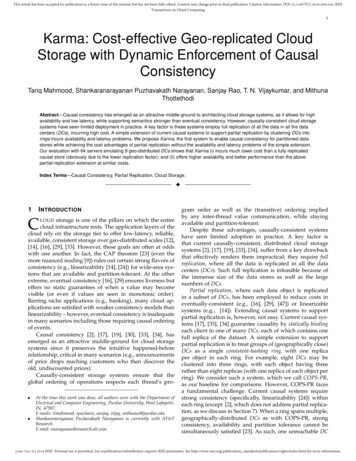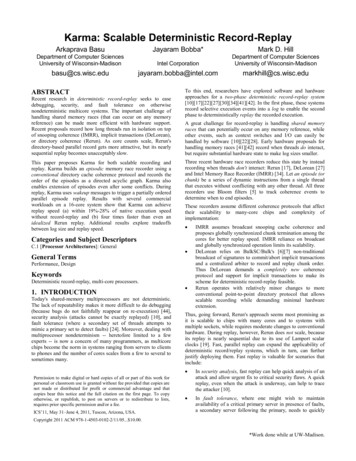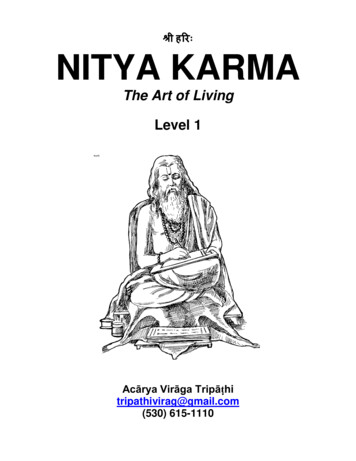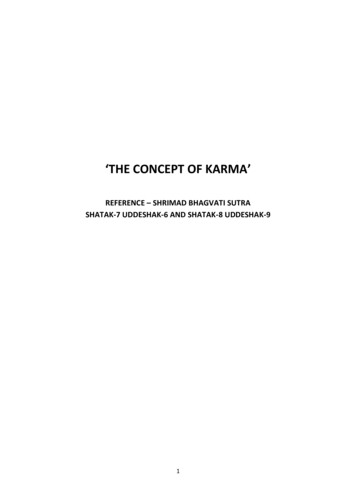
Transcription
‘THE CONCEPT OF KARMA’REFERENCE – SHRIMAD BHAGVATI SUTRASHATAK-7 UDDESHAK-6 AND SHATAK-8 UDDESHAK-91
INDEXSL. NO.SUBJECTPAGE NO.1.GYAANAVARNIYA KARMA62.DARSHANAAVARNIYA KARMA153.VEDNIYA KARMA164.MOHNIYA KARMA295.AAYUSHYA KARMA356.NAAM KARMA447.GOTRA KARMA488.9.ANTARAAYA KARMACONCLUSION54592
READ CAREFULLYFRIENDS!We all desire as under:1. My happiness may keep growing incessantly.2. My intellect may be clear and sharp.3. I may shed the burden of my sinful karmas and feel lighter4. Never may I be reborn in hell and in tiryanch yoni.5. The power within me may become manifest, enabling me to makeefforts unremittingly.6. My faith in and devotion towards deva-guru-dharma may keepgrowing relentlessly.FRIENDS!This will be possible only when we –1. Know the reasons of the eight karma bondages.2. “What are the unnecessary sinful acts that we commit in our day to dayliving?” Keeping this in mind, we make right efforts to avoid them.O Sublime Souls!Should we obviate unnecessary sinful deeds through constant awareness, wewould surely be able to unburden our soul by shedding ‘paap karmas’ and willbe able to quicken the pace our steps towards eternal bliss.Comrades!To know, what are the unnecessary sinful deeds that we commit in the courseof our daily routine and which can be easily avoided, let’s commence our studieswith concentration of mind and one-pointedness.3
INSTRUCTIONSIt is advised that readers shall at all times keep a pencil or ahighlighter with them, so as to mark or jot down any suchpoints that they might feel is noteworthy, or would be helpfulto them. More particularly, points relating to sinful deeds thatone might be engaging in unawares at the moment, but canbe got rid of it with slight awareness, must definitely bemarked.Friends, the purpose of this exercise is that, if we do not getthe opportunity to re-read the entire book, we can at least gothrough the marked/highlighted portions every week ormonth, so that we are always inspired to continue to moveforward in our lives.4
Tirthankar Lord Mahaveer has specifically stated Raag- Dwesh i.e. attachmentand aversion, to be the root cause of all the eight karma bandhas. However, outof infinite compassion towards all beings, he has described the reasons of karmabandh in detail for the benefit of the common people.Karma action, which could be mental (thoughts), verbal or physical.Q. What is karma bandh?A. Karma bandh or the bondage of karma is the mutual intermingling of the souland the karma (karman particles, or varganas, are attracted to the soul by theactions of that soul)The karmas can be good (punya) or bad (paap).The good karmas are the result of good or pious acts while the bad karmas arethe result of bad or sinful acts.When the soul acts, driven by passion, like aversion, attachment, anger, greed,ego, or deceitfulness, it attracts these karman varganas to itself.Karmas are the derivatives of the karman particles, a type of non-living matter.When these karman varganas get attached to the soul, they are called karmas.Depending upon the nature of the results of the karmas, they are grouped intoeight types. They are:1. Gyaanavarniya Karma - obscures knowledge.2. Darshanaavarniya Karma - obscures existential awareness.3. Vedniya Karma makes one feel happy or sad.4. Mohaniya Karma - causes delusion.5. Naam Karma - determines the various characteristics of our body.6. Gotra Karma- determines someone as superior or inferior.7. Aayushya Karma- determines the lifespan of any living being.8. Antaraaya Karma- causes obstruction.5
GYAANAVARNIYA KARMAGyaan knowledgeAavaran mask, hide, obscureGyaani knowledgeable or the learned, the one who has acquired theknowledge.The karma which in its active form (uday) obscures the knowledge attribute ofthe soul is known as gyaanavarniya karma, it dims the light of knowledge ofthe soul.GYAANAVARNIYA KARMA BANDH - SIX REASONS1. GYAANPRATYANIIKTA- OPPOSE2. GYAANNINHAVTA- HIDE3.GYAANANTARAAYA- HINDER5. GYAANAASHATANADISGRACE4. GYAANPRADWESH- AVERSION6. GYAANVISANVAADANTADISPUTE1. GYAAN PRATYANIIKTA- To oppose the gyaan and the gyaani.2. GYAAN NINHAVTA- To hide the gyaan or to hide the name of the teacher(gyaani).3. GYAAN ANTARAAYA- To obstruct gyaan.4. GYAAN PRADWESH- To dislike the gyaan and the gyaani (overwhelmed by thefeeling of jealousy and disinterest towards gyaan and gyaani).5. GYAAN AASHATANA- To disgrace and disrespect the gyaan and the gyaani.6. GYAAN VISANVAADANTA- An attempt to falsify the statement of the gyaan andof the gyaani by sophism.6
1. GYAAN PRATYANIIKTA - OPPOSING THE GYAAN AND THE GYAANI LEADSTO GYAANAVARNIYA KARMA BANDH.The following situations are examples wherein one defies knowledge thereby,leading to gyaanavarniya karma bandh.1. “There is no benefit in acquiring gyaan”; “gyaan would not fill an emptystomach, instead of wasting time learning gyaan one should work hardand earn money to live a comfortable, luxurious life.”2. Considering knowledge to be futile or irrelevant; some youngstersindulging in luxuries of the world say, “Hey! This youth is not to be wastedbeing a book worm. It is the time to enjoy, relax and chill.”3. Some people oppose the gyaani saying, “Hey! Their knowledge lacksdepth, it is just superficial” etc.4. When one opposes the true principles stated in the ‘aagam’ (Jain holybooks), only because they fail to follow them.5. Some people become hostile towards the gyaan as they might have comeacross gyaanis with unethical character. Hence, they form a perceptionthat acquiring knowledge is futile and instead emphasis must be laid uponconduct. However, they forget that without acquiring knowledge,conduct cannot be moulded.6. When people oppose teachers in college by conducting a rally orprocession against them.7. When a teacher opposes other teachers, to prove them wrong.8. When a person disregards facets of knowledge. For example, calling kevalgyaan, manna paryaaya gyaan etc. as all useless, foolish things.Keval gyaan absolute knowledge, omniscienceManna paryaaya gyaan the knowledge or science by which the thoughtsof other’s mind can be read.9. When a person is advised by his subordinate, or someone of a lowerstatus, and he considers it to be an insult and disregards it or opposes it.7
2. GYAAN NINHAVTA- HIDING KNOWLEDGE LEADS TO GYAANAVARNIYAKARMA BANDH.NIHNAVATA- hiding, concealingThe following situations are examples wherein one hides knowledge therebyleading to gyaanavarniya karma bandh.1. When two students do homework together, and if one of them hidesanswers to difficult questions from the other, with the selfish motive toearn appreciation, as he would be the only one in class to give all theanswers.2. When a person hides key aspects of some knowledge or information, andshares the rest. Example: While sharing details of a recipe, one or twoessential steps or ingredients are not disclosed, so that the outcome isn’tthe same as expected.3. When students do not divulge the name of their tutor, from fear thatother students might learn from the same tutor and outsmart them, byscoring better in the exams.4. Some people don’t acknowledge a person who is younger or junior in rankor status, as their teacher, despite having learnt from them; or they donot disclose that teacher’s name on being asked. For instance - a persondoes not disclose the name of the neighbour or daughter-in-law fromwhom they have gained knowledge.5. When a teacher keeps back a few key points from the class while teachingfrom fear that he wouldn’t any longer remain distinctive, important orspecial.6. When a person conceals his knowledge from fear that he might beassigned a task on that basis; his denial would help to avoid the task.7. When a person gets an article, song or text written by someone elsepublished under their own name.8. When a person edits a bhajan (devotional song) composed by someoneelse, without the composer’s permission; when one removes the name ofthe sangh which has composed/sponsored the song and labels it underone’s own sangh’s name; when one removes bhajan composer’s nameand replaces with another name; or makes slight changes in the lyrics.8
Note: There is no objection in making a new bhajan having a similar hymn.But it is wrong to plagiarize the bhajan or pirate it by tampering with afew words.9. When a person knows a simpler method of teaching, learning orremembering, but he hides it and does not share it with others.3. GYAAN ANTARAAYA- CREATING HINDRANCE IN KNOWLEDGE LEADS TOGYAANAVARNIYA KARMA BANDH.ANTARAAYA – obstructThe following situations are examples wherein one creates hindrance inknowledge thereby leading to gyaanavarniya karma bandh.1. When people encourage their sons to acquire knowledge but discouragetheir daughters and daughters-in-law from studying. They ask them todo household tasks during their study hours.2. When a person shows interest in learning religion or practicesswadhyaaya (Jain prayers), his relatives, family members, colleagues orpeer group often start creating hindrance in his learning (fearing hisinclination towards monkhood) so that his mind remains engaged in theaffairs of the world.3. When a child is studying, someone else comes over and distracts him bywatching television or singing loudly.4. When someone is engaged in spiritual studies or in memorizing verses(gaatha) inside the sthanak (Jain prayer hall), another person comesover and starts singing out bhaktamara, or some other bhajan loudly.5. To make a request for maanglik when the sadhu-saadhvis are engagedin their own prayers (swadhyaaya).6. To hide someone’s book, notebook etc. so that he cannot study.7. When an individual finishes off his studies but intentionally disturbsothers’ studies by making requests for playing around, wandering orgoing to movies, so that the other students lag behind in their studies.8. To discuss unimportant and inessential issues with m.sa., like:i) 4 vikatha – (worldly discussions that are devoid of gyaan)(a) That player played so well today.(b) Today a new movie got released.9
(c) Such and such are the trending dressing styles for womenthese days.ii) Family or business - related discussions (a) Now, my financial status is not of desired standards.(b) I really want to buy my own house but haven’t been able toarrange the required amount.(c) My son is 30 years now, but, I have not been able to get himmarried yet.(d) I have suffered huge loss in business. I am not able tounderstand how to take the business forward now.(e) I am thinking of partnership with that person. Will it bebeneficial? Shall I go ahead with it?iii) Health - related discussions(a) Father is not keeping well. I have consulted many famousdoctors from Mumbai and Hyderabad but to no avail.(b) My health too doesn’t seem to be good. Whatever I eattriggers gastritis. I am suffering from piles too.(c) My wife has knee problems, besides high blood pressure.(d) M.sa., please share some mantras. My wife is unwell and is onthe brink of slipping into depression. If you share thesemantras, she will regain her health and be in a position toattend to household chores.9. To postpone group lessons for selfish reasons. For instance- “I can’tremain present on that day, so let’s postpone the class for two days.”4. GYAAN PRADWESH - HAVING AN AVERSION FOR KNOWLEDGE LEADS TOGYAANAVARNIYA KARMA BANDH.PRADWESH - dislike, jealousy.The following situations are examples wherein one has aversion for knowledgethereby leading to gyaanavarniya karma bandh.1. When one considers the gyaan to be boring and deliberately goes latefor the discourse (pravachan), class etc.10
2. When one does not make the required efforts for acquiring the gyaanand finds excuses for not studying like, “I can’t memorize, I don’t havetime” etc.3. When one is jealous of someone who has acquired a lot of knowledge ina short span of time.4. A sage (who does not have many people coming to him) developsjealousy or dislike for another sage who has too many followers comingto him for gaining knowledge.5. When someone has put in a lot of efforts and time trying to learnsomething but fails to learn it; often he develops a dislike for the same.6. Not being able to stomach others doing better than oneself, andrejoicing when they score less marks.7. Discrimination by the teacher between two students of equal calibre,while teaching.8. After working hard day and night, a person attains a degree.Subsequently, when he fails to get a job as per his qualifications, hedevelops a dislike for knowledge.5. GYAAN AASHATANA - DISCREDITING KNOWLEDGE LEADS TOGYAANAVARNIYA KARMA BANDH.AASHATANA - discredit, disgrace, insult, humiliate.The following situations are examples wherein one discredits or trivializesknowledge thereby leading to gyaanavarniya karma bandh.1. To address someone who has committed a mistake by using slang orbelittling terms like, stupid, foolish, idiot, nonsense etc.2. To read a scripture or text despite being forbidden by the guru to do so.3. To mock someone by making sarcastic remarks, when advised orcorrected by them.4. Not showing adequate respect or reverence by standing, when a gyaanisadhu or shravak approaches you.5. When one mocks the guru (teacher). Example: to crack a joke on theguru, to mimic the guru, throw paper aeroplane, chalk etc. at the guru.11
6. After learning something from someone and then not acknowledging itby making remarks like, “Hey! I knew this beforehand. What’s the bigdeal?” etc.7. While teaching, if the student fails to understand and the teacher getsirritated, or shouts at the student.8. When a teacher teaches undeserving students and neglects thosestudents who are capable of learning.9. When a student back-answers or insults the teacher.6. GYAAN VISANVAAD - FALSE AND FALLACIOUS ARGUMENTS ABOUTKNOWLEDGE - LEADS TO GYAANAVARNIYA KARMA BANDH.VISANVAAD - Trying to prove the gyaan and the gyaani to be wrong, byresorting to flawed and spurious argument,The following situations are examples wherein one engages in sophistry todiscredit knowledge leading to gyaanavarniya karma bandh.1. When one believes the principles of material science to be true and usesthe misconceptions to prove their argument.2. When one knows that the beliefs of his sect are not right, yet argues in itsfavour.3. Making a false statement while teaching, or while delivering a speech, oramidst a discussion, and yet trying to prove it right by all means, bysophistry, by using false evidence, or by flawed arguments.Come, let us understand this through a conversationCONVERSATION I –Fallacious arguments between a teacher and his student, RahulGuruji: Rahul! Your mother has given birth to you. She has done a lot of favorsto you. Hence, you must take care of your mother and serve her.Rahul: Guruji! What is the favour in giving birth to me? She was called infertilebefore giving birth to me. People used to consider even seeing her as a badomen; because of me, she is free from this blemish. So how is this a favour doneby her? In fact, this is a favour from me to her.Guruji: Rahul! She nourished you, fed you, took care of you and is responsiblefor your upbringing.12
Rahul: Guruji, she was entertained and amused by me. She enjoyed adoring meas her toy. She was very happy to have me in her life. This was my favour to her,right! How has she favoured me?Guruji: Rahul, she has nurtured you with her milk.Rahul: Sir! If I hadn’t drunk the milk, she would have suffered as her breastswould have burst and she would have fallen ill. It was my favour to her that Isaved her from illness. How has she favoured me here?Guruji: Rahul, your mother carried you for nine months. She has suffered a lotof pain for you.Rahul: She did all that for her own interest, for her own pleasure. If it is herfavour to me, I am ready to pay her rent for bearing me for nine months.Guruji: Rahul! If you wish to pay the rent, then return her three organs (flesh,blood and brain).(Rahul, now abandons his false arguments and accepts the reality.)Rahul: Guruji, I knew that my parents have done a lot of favours to me. I was justtrying to triumph over you, using my debating skills; I wanted to turn back frommy duty. But now I am speechless, please forgive me for this sin. I promise youthat I will serve my mother with the utmost devotion—this is my promise to you.CONVERSATION II –Misleading arguments between a mother and her sonMother: Study enthusiastically.Son: Why should I study?Mother: You’ll gain knowledge.Son: What would I do with the knowledge?Mother: You’ll be able to do well in business or secure a good job.Son: What would I do with that?Mother: You’ll have money, recognition and a worthy life partner.Son: What would I do with that?Mother: You’ll lead a comfortable life.Son: All this, for a comfortable life? I am comfortable right now, too. For all this,why should I study?Basically, the son does not want to study, so he is quarrelling with his motherusing false arguments.13
CONVERSATION III Deceptive arguments between two brothers, Anil and Sunil.Anil: Dear Sunil, I want to eat Mexican cheese or Britannia cake.Sunil: Brother, we are Jains. These items have non vegetarian ingredients. So,we must not eat them.Anil: See, brother, I will be uneasy until I eat it. Our religion says that the firstpriority should be peace of mind. So, it is better that I eat it and be peaceful.Sunil: Finding peace of mind doesn’t mean that one should give in to the urge tofulfill all desires—they could be good or bad. It rather means to control one’sdesires and let the mind be at peace, undeterred by them.Anil: You are wrong. Until a person fulfills his desires, how can he know peace?One must fulfill one’s desires in order to remain peaceful.(Sunil remained silent for a while and then slapped Anil hard on the face).Anil: (angrily) Hey! Why did you slap me?Sunil: Brother, I really had this desire to hit you. So, I hit you. More so, since youhave just said that one must fulfill one’s desires for peace of mind.Now, Anil understood that his way of pacifying the mind by fulfilling desires waswrong. In this way, the mind becomes more distressed instead of becomingpeaceful.DOUBT Q. What is the difference between gyaan pratyaniikta and gyaanvisanvaadanta?A: Gyaan pratyaniikta refers to opposing of the gyaan and the gyaani, but hereno false arguments are used to prove them wrong.Gyaan visanvaadanta involves efforts to prove the gyaan and the gyaani to beuntrue with fake evidences and misleading arguments.14
DARSHANAAVARNIYA KARMADARSHAN awareness of existence, perceptionAAVARAN obscure, mask, hideDARSHANVAAN perceiver, the being who has darshan.DARSHANAAVARNIYA KARMA - The karma which in its active form (uday)obscures the darshan attribute of the soul.REASONS FOR DARSHANAAVARNIYA KARMA BANDH1. DARSHAN PRATYANIIKTA-. To oppose darshan and darshanvaan.2. DARSHAN NINHAVTA- To hide darshan or to conceal the name of thedarshanvaan.3. DARSHAN ANTARAAYA- To obstruct darshan.4. DARSHAN PRADWESH- To dislike darshan and darshanvaan.5. DARSHAN AASHATANA- to disgrace and disrespect darshan anddarshanvaan.6. DARSHAN VISANVAADANTA- to make false arguments against darshan anddarshanvaan.To acquire the basic existential perception of any object or being is Darshan.Any perception beyond the existential aspect of an object or being is referredto as Gyaan.Gyaan and darshan are co-related and inter-related. Hence, the deeds thatlead to gyaanavarniya karma bandh, also certainly lead to darshanaavarniyakarma bandh.Therefore, detailed description of the six reasons for darshanaavarniya karmabandh is on the same lines as for gyaanavarniya karma bandh.Note: Examples of darshanaavarniya karma bandh are similar to those ofgyaanavarniya karma bandh.15
VEDNIYA KARMAThe karma which in its active form (uday) makes one feel happy or sad withrespect to the five senses and the mind is called vedniya karma.VEDNIYA KARMA BANDH22 REASONSSAATA - VEDNIYA KARMA BANDHASAATA - VEDNIYA KARMA BANDH10 REASONS12 REASONSSAATA-VEDNIYA KARMA BANDHThe karma which in its active form (uday) makes one feel happy with respectto the five senses and the mind is known as saata vedniya karma.10 REASONS FOR SAATA-VEDNIYA KARMA BANDH1. Praan anukampa2. Bhoot anukampa3. Jeev anukampa4. Satva anukampa5. Not hurting numerous living beings (praan, bhoot, jeev, satva) mentally orphysically.6. Refraining from causing grief to numerous living beings (praan, bhoot, jeev,satva)7. Not causing numerous living beings (praan, bhoot, jeev, satva) to shrivel8. Not creating an occasion of sorrow for a numerous living beings (praan,bhoot, jeev, satva)9. Refraining from hurting numerous living beings (praan, bhoot, jeev, satva)physically10. Not torturing numerous living beings (praan, bhoot, jeev, satva) physically.16
Let us know about it in detail:SAATA VEDNIYA KARMA BANDH - 10 REASONS1. PRAAN - living beings with two (beindriya), three (teindriya) or four(chaurendriya) senses.2. BHOOT - vegetation; all plant forms (vanaspatikaya)3. JEEV - Living being with five senses (panchendriya)4. SATVA - Prithvikaya (mud, salt etc.), Apkaya (water), Teukaya (fire),Vayukaya (air).ANUKAMPA - compassion, mercy.5. Not hurting- to not hurt anyone physically or mentally6. Refraining from causing grief - to not make them feel low, to notdemoralize them, to not give them sorrow of separation, to not makethem feel ignored or indifferent.7. Not causing others to shrivel, i.e. to not make them grieve in such a waythat their body becomes feeble and weak out of anxiety.8. Not creating an occasion of sorrow which might cause them to mourninconsolably or shed tears.9. Refraining from hurting - to not beat or hurt anyone with an object like acane, wooden stick etc.10. Not torturing - to not cause agony, to not trouble others physically, tonot make them sad, to not harass them, to not annoy them.Note: The 5-10 points of saata vedniya karma and the 7-12 points of asaatavedniya karma are contradictory. Hence, rather than describing both sets ofpoints in detail, only points 7-12 of asaata vedniya karma, have been dweltupon at length.17
1. HAVING COMPASSION FOR PRAAN LEADS TO SAATA VEDNIYA KARMABANDHThe following situations are examples of compassion for praan (living beingswith 2, 3 or 4 senses) leading to saata vedniya karma bandh.1. When one ensures, out of compassion, that flies, mosquitoes etc. do notlose their life by falling in hot milk or in a deep-frying pan of hot oil, bycovering the vessel;2. When one strains/filters water to ensure, out of compassion, that multisensed living beings and tiny microbes do not pass into the mouth;3. While eating at night, small insects might enter the mouth along with foodmorsels. Hence, out of compassion, abstaining from eating at night.4. Exercise caution as a preventive measure to keep insects, cockroaches,ants, mosquitoes etc. at bay, so that later on deterrents and killers suchas Good Night, Pest Control, Lakshman Rekha are not required to be used.Also, despite taking preventive measures, if insects etc. appear then, outof compassion, not using sprays or repellents to kill them.5. There is a possibility of tiny life-forms thriving in food items like dates,cashew nuts, etc. over time. Hence, to be alert beforehand to obviate suchgrowth, and also exercise extreme caution before consuming them i.e.making an effort to check, inspect and only then proceed to eat.6. Cleaning the hearth, fireplace or stove properly early in the morning, soas to avoid killing insects/worms/other tiny creatures that might havefound their way through pores or gaps and ensuring that such creaturesare taken out unharmed and put in a safe place.7. Grains stored in excess draw colonies of tiny living beings. Out ofcompassion towards them, one should avoid such excess storage,beyond what is essential.8. To not use medications, including shampoos, to kill lice in the hair.9. To finish off all the food in one’s plate and not leave any food; to notthrow away used plates/glasses here and there carelessly after eating atroadside food-stalls or at wedding functions. Otherwise the smell offood can draw ants and other tiny creatures who might get killed whensomeone stamps on them or cleans the area.18
Rather than dumping leftover food items by roadside, or in the drains,one can feed animals and birds; it not only satiates their hunger but alsoprevents hinsa as discussed in (9) above. Sometimes leftover food is putin a plastic bag which is then disposed off by the roadside. Cattle chewon it, swallowing plastic along with the food, and get choked to death.Hence, a shravak should conduct himself with full discretion.2. HAVING COMPASSION FOR BHOOTA (VEGETATION) LEADS TO SAATAVEDNIYA KARMA BANDHThe following situations are examples wherein mercy showed to bhoota leadsto saata vedniya karma bandh.1. To abstain from eating sachit food items; to set a limit on theconsumption of green vegetables, fruits etc.; to abstain from eatingjaminkand (root vegetables or those growing underground) as an act ofcompassion towards infinite life forms that inhabit them.2. To avoid unnecessary violence through use of flowers at weddings andother functions(a) No floral decorations(b) To not use sachit flowers for decoration(c) Avoid organising programme in lawns or gardens.3. Exercise caution and discretion to obviate growth of fungus on fooditems, especially during the rainy season, say agra ka petha, murabba,pickle etc. which, if left uncared for over a long duration, are susceptibleto fungal growth. As a measure of compassion towards these life forms(fungus), such food items must be stored with care and checkedperiodically.4. One must practice compassion for plant forms while going for walks inthe parks as well. One can avoid walking on the green grass or pluckingflowers or leaves unnecessarily.5. There is growth of algae in front of many houses and buildings duringthe rainy season. With subsequent movement on those paths whileentering or leaving the building, infinite living beings would be harmed.To avoid this unconscious killing of infinite micro living beings manyprudent shravaks mark out a white-painted strip from their house to the19
road; in this way they save themselves and their family members frominflicting violence on such living beings. This also serves to cautionmany other people who might unknowingly hurt lives. Such discretion,potraying compassion, is called for.6. Many people have the habit of tinkering with the peels, seeds etc. ofvegetables, either with the hand or with the knife. Out of compassion forplant life forms, one should not thus fiddle with them.7. When one goes to a green grocer, and examines vegetables or fruitsrandomly with no intention of buying them, he needlessly harms plant lifeforms, as they are sensitive to touch. So, out of compassion, one mustrefrain from such acts. Also, one should not buy a lot of veggies and storethem in the refrigerator. It is painful for these life forms for as long as theyare stored thus.8. One should avoid using vegetables that need to be salted after peelingthem, prior to being cooked. For example, bitter gourd etc.3. HAVING COMPASSION FOR JEEV (PANCHENDRIYA) LEADS TO SAATAVEDNIYA KARMA BANDHJEEV (panchendriya), means living beings having all the five sensesThe following situations are examples where showing compassion for jeev(panchendriya) leads to saata vedniya karma bandh.1. Besides serving parents, the sick, the elderly etc. as much as possible, oneshould also offer one’s services at places like orphanages, old age homesetc.2. Saving a mouse when a cat is about to pounce on it, and similarly, to saveany jeev from dying.3. When one sets aside one’s priorities to help a wounded human being, acow, a pigeon etc. post an accident. (If one doesn’t know much aboutnursing them one can seek help from veterinary hospitals or animalfriendly organisations).4. To make people realise the true nature of religion. For instance, to weanaddicts off non - vegetarian food, etc.5. After trimming, one must not throw the nails directly into the dustbin oron the road. If a pigeon or any other bird pecks at the nails along with the20
6.7.8.9.grains, the nail might get stuck in its throat and may cause its death.Hence, one must wrap the nails in a piece of cloth and dispose itappropriately.Similarly, girls must not bunch strands of hair and put it directly in thegarbage. It was observed somewhere that a bird was agonized when itslegs got stuck in a bunch of hair. A kind shravak disentangled its legs fromthe bunch, and it flew away.One should not feed birds with grains, nor install water-filled vessels forthem to drink from, at places which are not safe for them, as they mightbe preyed upon by cats or dogs.One must not fly kites as it is often seen that birds become entwined inthe string of the kite, hurting themselves, or even getting killed. Out ofcompassion, one must abstain from flying kites.For entertainment purposes, one must not encage birds, nor keep fishtrapped in fish tanks. Also, one must avoid elephant rides, horse rides etc.A single breach of celibacy (i.e. indulgence in sexual intercourse) leads toviolence against several five-sensed living beings. Hence, one mustobserve celibacy to the maximum extent possible. Celibacy is obligatorywhen a woman is pregnant, lest the foetus should suffer pain. Thus,practice compassion by adhering to celibacy.4. HAVING COMPASSION FOR SATVA LEADS TO SAATA VEDNIYA KARMABANDHSATVA - prithvikaya, apkaya, teukaya, vayukayaCOMPASSION TOWARDS PRITHVIKAYA CAN BE FOLLOWED LIKE THIS: 1. Do not sprinkle salt on any edible items.2. One must avoid using kalam (instrument for writing, like ‘kachchi’ pencilor barta), a chalk may be used instead.(Kalam, kacchi pencil, barta are all sachit, whereas chalk is achit.3. Rangoli is sachit; avoid stamping on it.21
COMPASSION TOWARDS APKAYA CAN BE PRACTISED AS UNDER: 1. When utensils are washed directly under running water, excessive wateris consumed, and the water
6 GYAANAVARNIYA KARMA Gyaan knowledge Aavaran mask, hide, obscure Gyaani knowledgeable or the learned, the one who has acquired the knowledge. The karma which in its active form (uday) obscures the knowledge attribute of the soul is known as gyaanavarniya karma, it dims the light of knowledge of the


